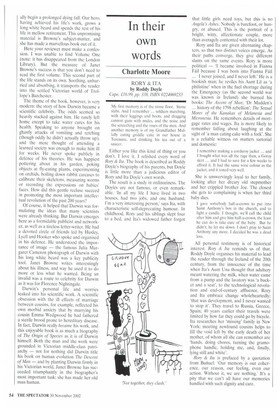In their own words
Charlotte Moore
RORY & ITA by Roddy Doyle Cape, £16.99, pp. 338, ISBN 0224069233
My first memory is of the stone floor. Stone slabs. And I remember ... soldiers marching, with their leggings and boots, and dragging cannon guns with mules, and the noise and the screeching and the roars of the men. And another memory is of my Grandfather Mullally eating griddle cake in Our house in Terenure, and drinking his tea out of a saucer.
Either you like this kind of thing or you don't. I love it. I relished every word of Rory & Ita. The book is described as Roddy Doyle's biography of his parents, but Doyle is little more than a judicious editor of Rory and Ita Doyle's own words.
The result is a study in ordinariness. The Doyles are not famous, or even remarkable. 'In all my life I have lived in two houses, had two jobs, and one husband. I'm a very interesting person,' says Ita, with characteristic self-deprecating humour. In childhood, Rory and his siblings slept four to a bed, and Ita's widowed father forgot that little girls need toys, but this is no Angela's Ashes. Nobody is barefoot, or hungry, or abused. This is the portrait of a bright, witty, affectionate couple, more than averagely contented with their lot.
Rory and Ita are given alternating chapters, so that two distinct voices emerge. As their paths converge, they give different slants on the same events. Rory is more political — 'I became involved in Fianna Fail because I was born into Fianna Fail I never joined, and I never left.' He is a bookish man; he reviles his Aunt Lil as 'a philistine' when in the fuel shortage during the Emergency (as the second world war was known in Ireland) she burned his books: The Ascent of Man; 'Dr Madden's ... history of the 1798 rebellion'; The Sexual Mores of the Kanakas of Melanesia and Micronesia. He remembers details of mortgage rates and wages. Ita is more likely to remember falling about laughing at the sight of 'a man eating cake with a fork'. She is a reliable witness on matters sartorial and domestic:
I remember making a corduroy jacket ... and I bought what was all the rage then, a Goray skirt ... and I had to save for a few weeks to afford it. It had the same wine colour as the jacket, and it toned very well.
She is unswervingly loyal to her family, looking after her dreary old stepmother and her crippled brother Joe. The closest she gets to complaining is when her third baby dies.
I gave somebody half-a-crown to put into Saint Anthony's box in the church, and to light a candle. I thought, well call the child after him and give him half-a-crown, the least he can do is take care of the baby. But he didn't; he let me down. I don't pray to Saint Anthony any more. I decided he was a dead loss.
All personal testimony is of historical interest. Rosy & Ita reminds us of that. Roddy Doyle organises his material to lead the reader through the Ireland of the 20th century, from the innocence of the time when Ita's Aunt Una thought that adultery meant watering the milk, when water came from a pump and the lavatory was 'a bucket and a seat', to the technological revolution and end-of-century affluence. Rory and Eta embrace change wholeheartedly; 'that was development, and I never wanted to stop it'. They travel to Russia, Greece, Spain; 40 years earlier their travels were limited by how far they could go by bicycle. Ita researches her 'missing' family in New York; meeting newfound cousins helps to fill the void left by the early death of her mother, of whom all she can remember are 'hands, doing chores, turning the gramophone handle, holding me, and, finally, lying still and white'.
Roty & Ita is prefaced by a quotation from Bufiuel: 'Our memory is our coherence, our reason, our feeling, even our action. Without it, we are nothing.' It's a pity that we can't all have our memories handled with such dignity and care.


























































































 Previous page
Previous page